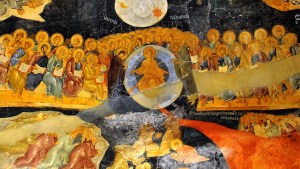It’s tempting to be afraid of Jesus’ second coming. Jesus will come again to judge the earth, and this thought can cause fear in many people.
The key to banishing this fear of Jesus’ second coming is to fully embrace Jesus’ first coming.
St. Augustine explains this idea in a commentary on Psalm 95.
He has come the first time, and he will come again. At his first coming, his own voice declared in the gospel: Hereafter you shall see the Son of Man coming upon the clouds. What does he mean by hereafter? Does he not mean that the Lord will come at a future time when all the nations of the earth will be striking their breasts in grief? Previously he came through his preachers, and he filled the whole world. Let us not resist his first coming, so that we may not dread the second.
The way we approach Jesus’ second coming is directly related to how we view God in the present time. If we love Jesus now, with our whole heart, we should have no cause for fear of when Jesus comes again.
He who is without anxiety waits without fear until his Lord comes. For what sort of love of Christ is it to fear his coming? Brothers, do we not have to blush for shame? We love him, yet we fear his coming. Are we really certain that we love him? Or do we love our sins more? Therefore let us hate our sins and love him who will exact punishment for them. He will come whether we wish it or not. Do not think that because he is not coming just now, he will not come at all. He will come, you know not when; and provided he finds you prepared, your ignorance of the time of his coming will not be held against you.
We should look forward to ehe coming of Jesus at the end of time, or at the very least, at the end of our earthly life. Our hearts should long to see Jesus and to be with him for all eternity. If we have any fear in our heart of Jesus, we should look inside ourselves and see what kind of attachments we still have to this earth or to our sins.
Let us welcome Jesus’ first coming, so that his second coming does not create any fear in our hearts.



